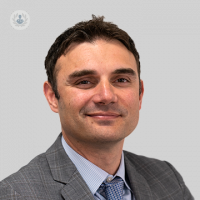Lower back pain: when to seek medical help
Written in association with:Lower back pain is extremely common and is the leading cause for people to seek medical advice. It has been estimated that up to 80 per cent of adults will suffer from lower back pain at some point in their lives. Here, pain management specialist, Dr Giancarlo Camilleri discusses the possible causes of low back pain and the treatment options available.

What causes lower back pain?
Whilst it’s often not possible to clearly identify a cause for back pain, sprains and strains of ligaments, muscles and tendons represent the most common cause. These normally result from overuse, twisting awkwardly, improper lifting or sports injuries.
When should I see a specialist about my lower back pain?
Low back pain often gets better on its own and recovery is often enhanced with over-the counter-pain killers, hot or cold compression packs, and gentle physiotherapy initially.
Individuals with low back pain should seek medical attention in the following situations (termed “red flags” by in the medical profession):
- Very severe pain especially pain to the mid-back around the rib cage
- Background history of cancer or recent unintended weight loss
- Difficulty walking or moving the legs
- Sensation of numbness or tingling in the legs
- Loss of bowel or bladder function
- Loss of sensation in the legs
- Pain that is not improving
- If back pain is associated with other concerning symptoms such as abdominal pain
- Back pain associated with fever
- Recent severe trauma such as falling from a height
What are the treatment options for lower back pain?
Most episodes of spinal pain are self-limiting. A diligent approach to using simple pain killers, physiotherapy and the gradual return to normal activities should be the strategy first employed.
Radiofrequency denervation, a minimally invasive procedure, should not be viewed as the first step for managing mechanical spinal pain. Unfortunately, facet joints cannot be repaired or replaced surgically and it is for this reason that radiofrequency denervations are used instead to help with pain arising from spinal facet joints that are not getting better of its own accord with time.
Do not hesitate to book an appointment with Mr Giancarlo Camilleri if you would like to discuss your treatment options for back pain.



